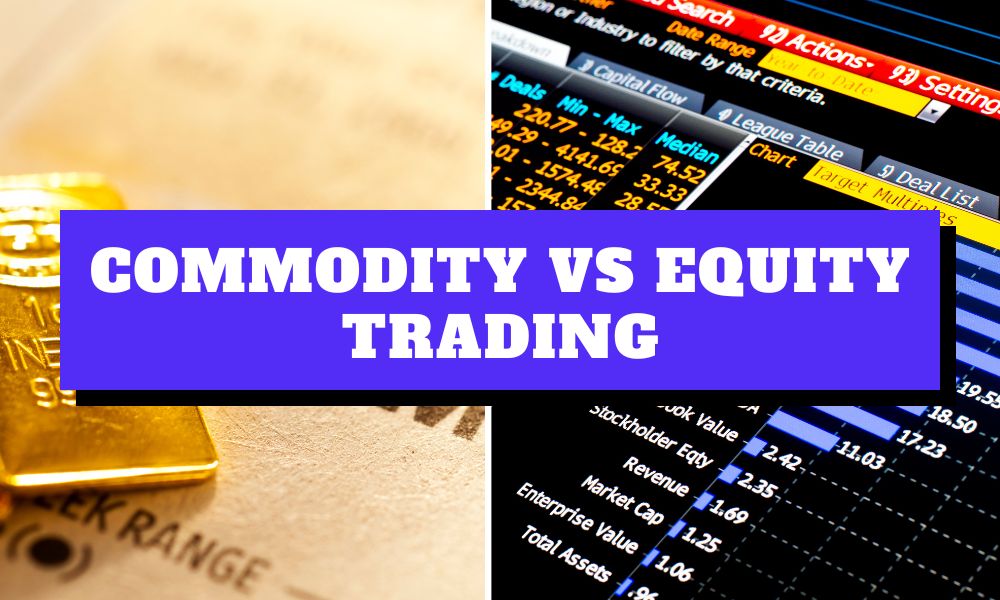Commodity Trading vs Equity Trading

Commodity trading and equity trading are two distinct types of financial trading, each involving different assets and markets. Here are key differences between commodity trading and equity trading:
| Feature | Commodity Trading | Equity Trading |
|---|---|---|
| Assets Traded | Physical goods or raw materials | Shares or stocks of companies |
| Market Characteristics | Influenced by supply and demand dynamics, weather events, geopolitical factors | Influenced by company performance, market sentiment, economic indicators |
| Ownership and Rights | Typically involves contracts; limited ownership rights | Partial ownership of the company; potential voting rights in shareholder meetings |
| Risk and Volatility | Subject to significant price volatility due to external factors | Volatility influenced by company-specific news and broader market trends |
| Leverage and Margin | Often allows for higher leverage, amplifying gains and losses | Leverage is generally lower; margin trading available with more conservative levels |
| Regulation | Governed by commodity market regulators | Regulated by financial authorities and stock market regulators |
| Delivery of Assets | Can involve physical delivery or derivatives trading | No physical delivery; trading in ownership stakes |
| Market Platforms | Traded on commodity exchanges | Traded on stock exchanges |
Assets Traded:
Commodity Trading: Involves the buying and selling of physical goods or raw materials such as gold, oil, agricultural products, and base metals. Traders can either deal with the actual physical delivery of the commodities or engage in derivatives trading based on the future price of the commodities.
Equity Trading: Involves the buying and selling of shares or stocks of companies. When you trade equities, you are essentially buying a portion of ownership in a company.
Market Characteristics:
Commodity Trading: Commodities are traded on commodity exchanges, where the focus is on the supply and demand dynamics of the physical goods. Prices are influenced by factors such as weather conditions, geopolitical events, and global economic trends.
Equity Trading: Equities are traded on stock exchanges, and prices are influenced by the company’s performance, market sentiment, economic indicators, and other factors affecting the business.
Ownership and Rights:
Commodity Trading: In most cases, commodity traders do not gain ownership of the physical commodities; instead, they are typically involved in contracts that speculate on the future price movements.
Equity Trading: Equity traders, by buying shares, become partial owners of the company and may have certain rights, such as voting rights in shareholder meetings.
Risk and Volatility:
Commodity Trading: Commodities can be subject to significant price volatility due to factors like weather events, geopolitical tensions, and global economic conditions.
Equity Trading: While equities can also be volatile, their prices are often influenced by company-specific news and events, as well as broader market trends.
Leverage and Margin:
Commodity Trading: Commodity markets often allow for the use of leverage, enabling traders to control larger positions with a smaller amount of capital. This can amplify both potential gains and losses.
Equity Trading: Leverage in equity markets is typically lower compared to commodity markets. Margin trading is available, but the levels are usually more conservative.
Regulation:
Commodity Trading: Governed by specific commodity market regulators and may have different regulatory frameworks depending on the type of commodities being traded.
Equity Trading: Regulated by financial authorities and stock market regulators that oversee the functioning of stock exchanges and ensure fair and transparent trading practices.
Ultimately, the choice between commodity and equity trading depends on the investor’s preferences, risk tolerance, and investment goals. Some investors may diversify their portfolios by participating in both markets.
